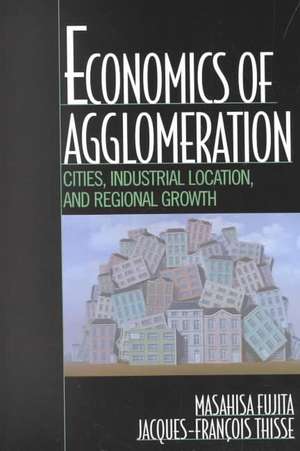ECONOMICS OF AGGLOMERATION NEW
en Paperback – 30 apr 2002
Preț: 246.04 lei
Preț vechi: 270.14 lei
-9% Nou
Puncte Express: 369
Preț estimativ în valută:
47.09€ • 51.17$ • 39.59£
47.09€ • 51.17$ • 39.59£
Carte tipărită la comandă
Livrare economică 18-29 aprilie
Preluare comenzi: 021 569.72.76
Specificații
ISBN-13: 9780521805247
ISBN-10: 0521805244
Pagini: 480
Dimensiuni: 152 x 229 x 27 mm
Greutate: 0.7 kg
Ediția:New.
Editura: Cambridge University Pr.
Locul publicării:New York, United States
ISBN-10: 0521805244
Pagini: 480
Dimensiuni: 152 x 229 x 27 mm
Greutate: 0.7 kg
Ediția:New.
Editura: Cambridge University Pr.
Locul publicării:New York, United States
Cuprins
1. Agglomeration; Part I. Fundamentals of Geographical Economics: 2. The breakdown of the price system in a spatial economy; 3. The von Thünen model and land rent formation; 4. Increasing returns vs. transportation costs: the fundamental tradeoff of a spatial economy; 5. Cities and the public sector; Part II. The Structure of Metropolitan Areas: 6. The spatial structure of cities under communication externalities; 7. The formation of urban centers under imperfect competition; Part III. Factor Mobility and Industrial Location: 8. Industrial agglomeration under Marshallian externalities; 9. Industrial agglomeration under monopolistic competition; Part IV. Urban Systems and Regional Growth: 10. Back to von Thünen: the formation of cities in a spatial economy; 11. On the relationship between agglomeration and growth.
Recenzii
‘This is a wonderfully informative book on spatial economics, by two of the best people in the field. I learned a lot that I didn't know, and so will you. Better than any book so far, this integrates concepts that range from ‘edge cities’ to global divergence into a single grand view.’Paul Krugman, Princeton University
‘This new monograph by Masahisa Fujita and Jacques-Francois Thisse is a comprehensive survey of spatial economics, taking the reader all the way from von Thunen to the current research with clarity and rigor.’Robert Lucas, University of Chicago
‘As I started reading this book, I asked myself whether it was going to be the key reference in spatial economics for many years to come. After completing my reading, I am confident the answer is a resounding yes. This is a book of enormous merits.’Giles Duranton, Urban Studies
'This is a wonderfully informative book on spatial economics, by two of the best people in the field. I learned a lot that I didn't know, and so will you. Better than any book so far, this integrates concepts that range from 'edge cities' to global divergence into a single grand view.' Paul Krugman, Princeton University 'This new monograph by Masahisa Fujita and Jacques-Francois Thisse is a comprehensive survey of spatial economics, taking the reader all the way from von Thunen to the current research with clarity and rigor.' Robert Lucas, University of Chicago 'As I started reading this book, I asked myself whether it was going to be the key reference in spatial economics for many years to come. After completing my reading, I am confident the answer is a resounding yes. This is a book of enormous merits.' Giles Duranton, Urban Studies
‘This new monograph by Masahisa Fujita and Jacques-Francois Thisse is a comprehensive survey of spatial economics, taking the reader all the way from von Thunen to the current research with clarity and rigor.’Robert Lucas, University of Chicago
‘As I started reading this book, I asked myself whether it was going to be the key reference in spatial economics for many years to come. After completing my reading, I am confident the answer is a resounding yes. This is a book of enormous merits.’Giles Duranton, Urban Studies
'This is a wonderfully informative book on spatial economics, by two of the best people in the field. I learned a lot that I didn't know, and so will you. Better than any book so far, this integrates concepts that range from 'edge cities' to global divergence into a single grand view.' Paul Krugman, Princeton University 'This new monograph by Masahisa Fujita and Jacques-Francois Thisse is a comprehensive survey of spatial economics, taking the reader all the way from von Thunen to the current research with clarity and rigor.' Robert Lucas, University of Chicago 'As I started reading this book, I asked myself whether it was going to be the key reference in spatial economics for many years to come. After completing my reading, I am confident the answer is a resounding yes. This is a book of enormous merits.' Giles Duranton, Urban Studies
Descriere
This book explains the economic rationale for the clustering of firms and households.
